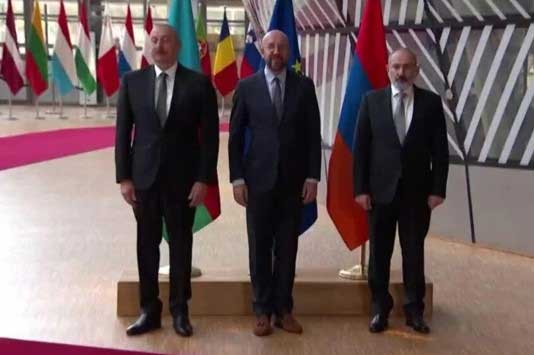European security summit in Spain clouded by Azerbaijan snub

Brussels: Europe’s quest to build a common geopolitical purpose brought four dozen of its leaders to Granada on Thursday, but its credibility suffered a blow when the Azerbaijani president stayed away.
Turkey’s President Recep Tayyip Erdogan was also expected to skip the European Political Community (EPC) summit, a loose grouping of European states inside and outside the EU and NATO.
But hopes that it would serve as a platform to calm tensions in the Caucasus, where Azerbaijani forces have captured Nagorno-Karabakh from ethnic Armenian rebels, were quickly dashed.
EU officials had hoped to host Azerbaijan’s President Ilham Aliyev and Armenia’s Prime Minister Nikol Pashinyan at the event in what would have been the pair’s first face-to-face meeting since the offensive.
But Aliyev has been angered by what he sees as French and German bias towards the Armenian position, and has refused to travel to the meeting.
“Erdogan’s second absence in a row weakens the EPC as a way to deal with Ankara in a format other than the EU, to which Turkey’s candidacy is frozen,” said Sebastien Maillard of the Institute Jacques Delors.
“Without Turkey and Azerbaijan, the political community becomes more narrowly European and seems more anti-Putin, give or take a few leaders,” he said.
“Without a Karabakh meeting, the agenda could flip to the migration crisis,” he said, predicting that Britain’s Prime Minister Rishi Sunak would seize the opportunity, having kickstarted the UK election campaign this week.
An Azerbaijani official said Aliyev would not attend because of “pro-Armenian statements by French officials” and because Paris has said it plans to deliver military equipment to Yerevan.
The official said Aliyev’s decision was also influenced by “accusations made yesterday by EU Council President Charles Michel”.
Michel, who has mediated several meetings between the foes in recent years, criticised Baku’s use of military force.
The official also cited an “anti-Azerbaijani atmosphere” and said Baku had wanted the meeting to take place in Turkey, its ally, which had welcomed the successful Karabakh offensive.
In Yerevan, Pashinyan told his parliament on Wednesday that he would still travel to Spain, and expressed regret he would not be meeting Aliyev.
“We were in a constructive and optimistic mood, because we thought that a turning point document could be signed,” he said.
“Until this morning the likelihood of this was very high.”
At the previous EPC meeting in Chisinau in June, the Armenian and Azerbaijani leaders met around a table with Michel, France’s President Emmanuel Macron and German chancellor Olaf Scholz.
But the conflict has since taken a dramatic turn, at once making the European diplomatic outreach more important, with refugees flooding into Armenia, but also further poisoning relations between the foes.
After a lightning offensive by Azerbaijani forces last month, most of the 120,000-strong Armenian population fled the self-proclaimed republic of Nagorno-Karabakh, which is now to be dissolved.
Since the fall of the Russian Empire, this mountainous region has been part of Azerbaijan, but it unilaterally proclaimed its independence with the support of Armenia when the Soviet Union collapsed in 1991.
Ethnic Armenian separatists resisted Baku with the support of Yerevan for three decades, notably during the first Karabakh war from 1988 to 1994 and the second in 2020.
But the international community never recognised the self-proclaimed republic, and Azerbaijani troops have now regained control.
With the Caucasus conflict falling down the EPC agenda, Britain’s Sunak and his Italian counterpart Georgia Meloni, will push a plan for tough action on migration.
On Wednesday, the 27 EU members – which are also EPC countries – agreed on the outline of a migration reform package to go before the European Parliament to better share responsibility for undocumented arrivals.
But for Italy and non-EU member Britain, both facing arrivals by sea, the reform will not go far enough.
“Levels of illegal migration to mainland Europe are the highest they have been in nearly a decade,” Sunak said Wednesday.
“With thousands of people dying at sea, propelled by people smugglers, the situation is both immoral and unsustainable. We cannot allow criminal gangs to decide who comes to Europe’s shores.”
Number 10 said Sunak and Meloni would chair a side-meeting at the EPC and announce initiatives to discuss “joint action” against what it dubbed “organised immigration crime”.
Russia’s war against Ukraine will also be on the EPC agenda, with European powers under pressure to further increase support for Kyiv as a political crisis in Washington hurts the parallel US effort.





